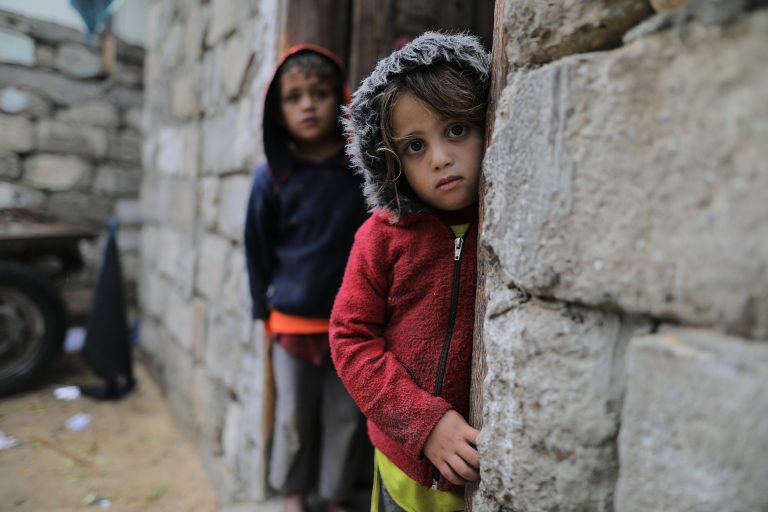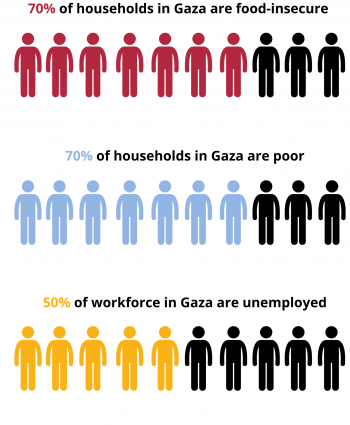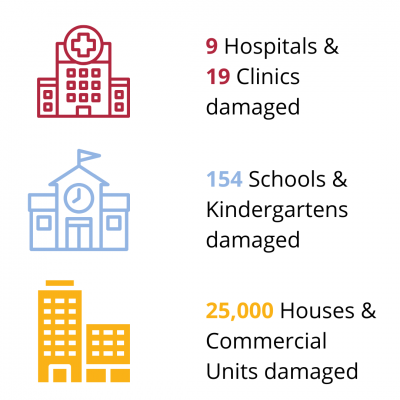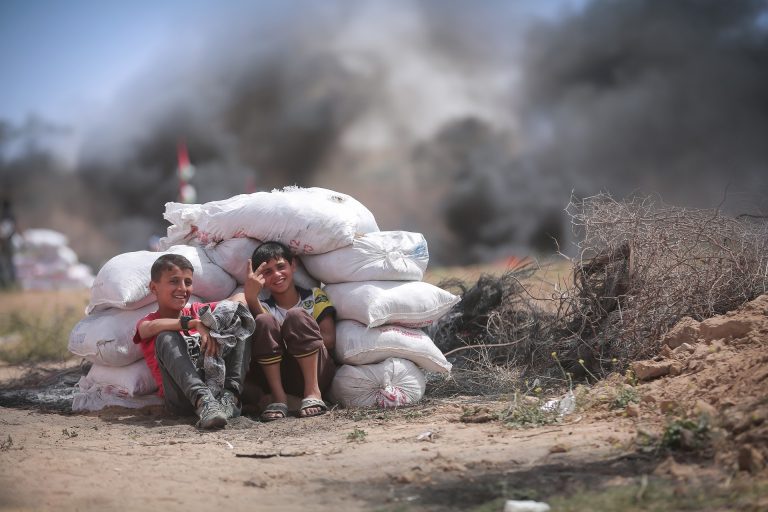

The Gaza-Strip in Palestine is often referred to as ‘the world’s largest open-air prison’.1 It has been under Israeli occupation for almost 55 years and under full blockade for 14 years. The Gaza-Strip is the only place in the world where the movement of people and goods are fully restricted (through land, air, and sea).2
The Gaza-Strip is one of the most densely populated areas in the world, with a population of 2.1 million,3 about half of which are children.4 Comparatively, it is almost the size of the city of Atlanta, Georgia in the United States, but with four times its population. In 2012, the United Nations (UN) warned that “Gaza will be unliveable by 2020”.5 Poverty and unemployment, the main causes of food insecurity, are at their peak in the Gaza-Strip.6

Children are severely affected by the dire living conditions in the Gaza-Strip. Imagine being held captive in the city you were born in, where essential services are effectively inaccessible, and having to live through a series of wars throughout your life with no route to escape.
The series of Israeli air force bombings on the Gaza-Strip in May 2021 caused 256 deaths (including 66 children and 39 women), and over 2,000 injuries to Palestinian civilians. The infrastructure was ravaged, and many buildings were damaged or completely destroyed (see figure 2).7 Israel imposes severe restrictions on the transfer of essential goods such as fuel and building materials,8 which means that re-building the damaged schools, houses, and health facilities is impossible.

The intense attacks on the Gaza-Strip are severely affecting the mental health of the 1 million children living there. A recent survey by Euro-Med Human Rights Monitor showed that 91.4% of children in Gaza suffer from conflict-related trauma.9 Another report by Doctors without Borders showed that 90% of young people in Gaza suffer from regular stress conditions.10
"I have many horrible nightmares, and a constant feeling of fear that I may be targeted with a bomb, or injured or killed"
- Samar, a 15-year-old girl from Gaza who has lived through three wars Tweet
Children in the Gaza Strip face stress, trauma and anxiety during Israeli war attacks mainly due to hearing and witnessing military planes and bombs, and experiencing the destruction of their homes and those of their relatives.12 Extreme depression and grief are very common among children who witnessed the injury or killing of loved ones.13
“I was afraid of the bombing, when I saw the picture of my friend and the scene of her death, I couldn’t control myself. I had a nervous breakdown for days and I was crying all the time. I always wondered when the bombing stopped if we would come out alive or dead."
– Maryam, a girl from Gaza describing the painful loss of her friend
Psychosocial support is scarce in the Gaza-Strip, and there is an urgent need for it. If these children do not receive the specialist support, they will be unable to cope with distress and fear of violence as adults.14 These can then interfere with their essential day to day tasks like dealing with work stress or forming healthy relationships.
The difficult living situation in the Gaza-Strip is unprecedented. Children living in this prison are paying the biggest price. Their lives are stripped of any dreams, hopes, and dignity.
On a policy level, local and international organisations must provide urgent medical care and psychosocial support to children in the Gaza-Strip. Outreach mental support services to houses and schools will help to ensure equitable access to care.
On a political level, advocates, human rights organisations and western “democracies” must intensify their calls to end the Israeli occupation of the Gaza-Strip and its human rights violations based on International Humanitarian Law.
You can write to congresswomen/men, senators and elected officials about the injustice in Palestine, and demand that the basic rights are afforded to the people living there. You can also donate to trusted organisations that support human rights and healthcare needs in Palestine.
We can never truly know what it’s like to be a child living in the world’s biggest prison if we have never been in their shoes. However, we can listen to their calls, share their voices with the world, and advocate for the dignified lives that they deserve.

More from Rasha Kaloti here.
BCPHR.org was designed by ComputerAlly.com.
Visit BCPHR‘s publisher, the Boston Congress of Public Health (BCPH).
Email [email protected] for more information.
Click below to make a tax-deductible donation supporting the educational initiatives of the Boston Congress of Public Health, publisher of BCPHR.![]()
© 2025-2026 Boston Congress of Public Health (BCPHR): An Academic, Peer-Reviewed Journal
All Boston Congress of Public Health (BCPH) branding and content, including logos, program and award names, and materials, are the property of BCPH and trademarked as such. BCPHR articles are published under Open Access license CC BY. All BCPHR branding falls under BCPH.
Use of BCPH content requires explicit, written permission.